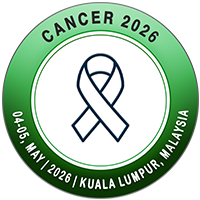
Gracjana Krzysiek-Maczka
Jagiellonian University, PolandPresentation Title:
Helicobacter pylori–activated fibroblasts as a silent partner in gastric cancer development. Protective action of hydrogen sulfide in the mechanism of procarcinogenic activation of gastric fibroblasts induced by Helicobacter pylori infection
Abstract
Despite considerable improvement in the early diagnosing and anti-cancer therapies, GC remains the fourth most common cause of cancer-related death in the world with 90% of all stomach tumors being malignant. GC is heterogeneous and contains cells with various stem cell properties referred to as cancer stem cells (CSCs). Recent advances in the field provided evidence that gastric CSCs are likely the result from dedifferentiation of metaplastic lineages including spasmolytic polypeptide expressing metaplasia (SPEM) and intestinal metaplasia (IM), normal adult gastric progenitor cells (GPCs)/stem cells, or bone marrow–derived mesenchymal stem cells (BM-MSCs). This process of dedifferentiation, recruitment, and transformation can be triggered by external environment, e.g., the continuous action of inflammatory mediators and stimulation by carcinogens like Helicobacter pylori (Hp). The interaction between microenvironment and stem cell compartment employs numerous signaling pathways including Wnt, Notch, TGF-β/BMP, and non-coding RNAs, thus the changes introduced to any component of stem cell/niche system may irreversibly disturb the sophisticated system for information exchange and interfere the proliferation/differentiation balance, leading to neoplastic transformation. One of the main components of the stem cell/niche system are fibroblasts and myofibroblasts. Hp(cagA+ vacA+) increases the number of myofibroblast and can further directly or indirectly activate them towards cells possessing the properties of cancer associated fibroblasts (CAFs), participating in cancerogenic expansion of stem and progenitor cells. The data obtained by our team indicate that the Hp-induced activation of fibroblasts employs proinflammatory pathways including positive feedback loop between NFκB and STAT3 pathways. We have shown, that reciprocal NFκB/STAT3 interactions can be blocked by hydrogen sulfide (H2S) administration. The protective mechanism of H2S can be the new strategy to cure human Hp infection complementing/ alternative the conventional anti-Hp therapy consisting of combination of proton pump inhibitors, antibiotics and bismuth subsalicylate notably given the late detection, increased antibiotic resistance and medication side effects (supported by statutory grant (N41/DBS/000875) from JUMC).
Biography
Gracjana Krzysiek-Maczka - Assistant Professor since 2011 in the Department of Physiology, Faculty of Medicine at Jagiellonian University, Medical College, Cracow, Poland. H-Index: 15; citations: 466


